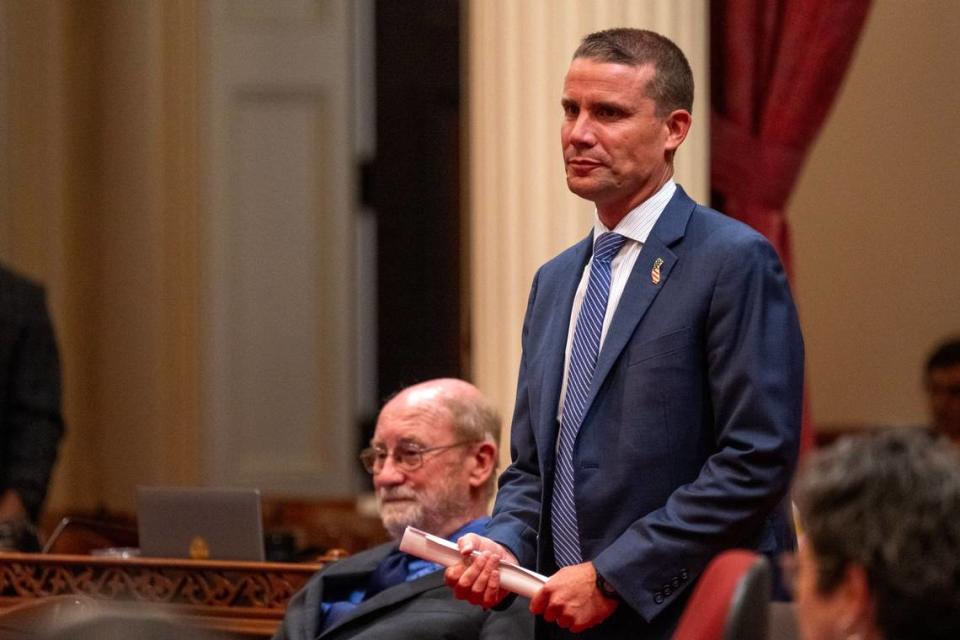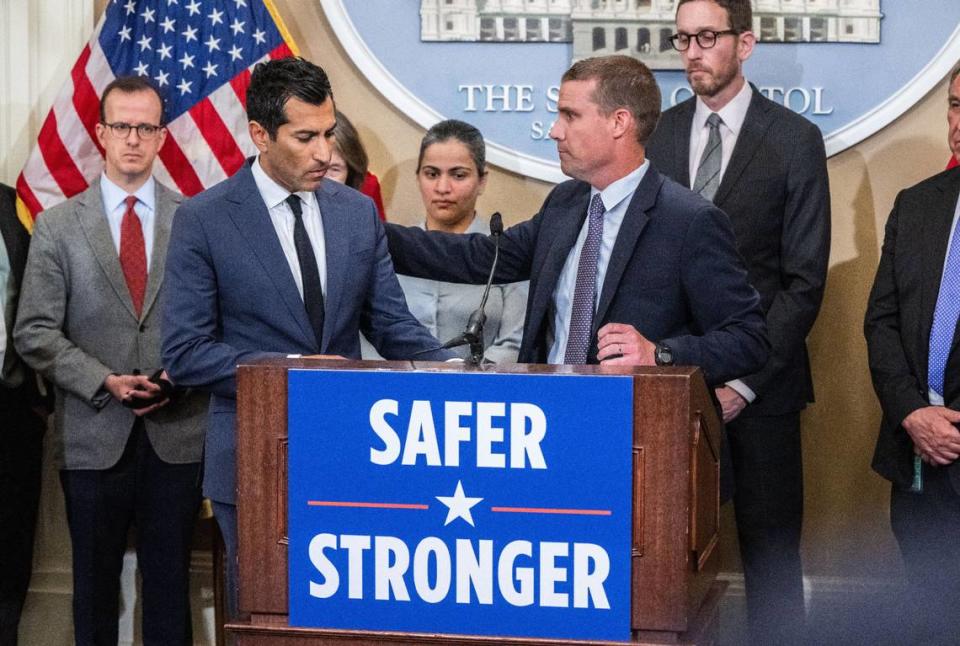California Democrats couldn’t kill ballot measure changing Prop. 47. What’s their new strategy?
California Democrats are hastily reworking their November election strategy for fighting a district attorney-led initiative to change Proposition 47 after Gov. Gavin Newsom’s last-minute decision to pull a competing ballot measure.
Legislative leaders and the governor are now banking on an embattled package of retail theft bills they’ve been pushing as an alternative to the California District Attorneys Association’s more punitive ballot measure.
If the lawmakers can quickly push their bills through in August, after a month-long recess, it may convince some retailers to back away from financially supporting the district attorneys’ initiative.
“It’s a bullet in the gun to try to kill the measure,” said Steve Maviglio, a Democratic political consultant. “They can say, ‘Well, the Legislature’s already done this. We’ve already done this.’ I don’t know if it’s going to fly, but it’s a little ammunition.”
Large retail chains — especially Walmart, Target and Home Depot — spent millions bankrolling signature collection efforts for the district attorneys’ ballot measure. How they spend their money ahead of the November election could determine the fate of the district attorneys’ ballot measure.
Rachel Michelin of the California Retailers Association said her focus is getting the bill package through the Legislature and onto the governor’s desk. After that, “we will go back and we will reevaluate where we’re at on the initiative.”
If lawmakers can advance the bills to the governor’s desk before the end-of-session crunch time in late August, that may influence retailers’ thinking on the district attorneys’ measure.
“We’re going to see what happens when they come back from from the break,” she said. “And see if they follow through on what they said they were going to do and see if the governor follows through on what he said he’s going to do.”
Pushing retail theft bills
The district attorneys’ initiative would allow the state to increase punishments for theft and drug crimes, requiring them to alter Proposition 47, the 2014 voter-approved initiative that made some lower-level crimes misdemeanors and set a $950 felony shoplifting threshold. It will be listed on the 2024 ballot as Proposition 36.
Lawmakers failed multiple times to convince the district attorneys to drop Proposition 36, the district attorney’s initiative that became eligible for the ballot in June.
Newsom, Assembly Speaker Robert Rivas, D-Hollister, and Senate President Pro Tem Mike McGuire, D-Healdsburg, have spent the past year saying they don’t support changes to Proposition 47. Instead, they’ve put forward an alternative slate of legislation that would also tighten penalties on retail theft-related crimes without seeking voter approval.
Leaders tried to use that package as leverage to get the district attorneys to drop their ballot measure. And when that failed, they crafted their own last-minute initiative that also would’ve changed Proposition 47, but in a more limited way than the measure they oppose.
Newsom’s administration and lawmakers worked during the final weekend before the legislative recess to develop the alternative, only for the governor to drop it the night before the Assembly and Senate were to vote on it.
After lawmakers return in August, Rivas and McGuire will focus on getting the alternative bills to the governor’s desk. The leaders’ biggest obstacle before the recess was a change they made to some of the measures voiding the legislation if voters approved the district attorneys’ initiative.
But they have since stripped that change, which may make it easier to get the bills out of the Legislature.
However, some Democrats running for re-election in purple districts may still find it challenging to oppose Proposition 36 at a time when voters are concerned about drugs and crime, said Wesley Hussey, professor of political science at Sacramento State.
“It puts them in situation where they have to say, ‘Here’s a real measure that will make changes to something that the public’s not very happy with. And I’m against that, or I’m not in favor of that,’” Hussey said. “And I don’t think coming back and saying, ‘Well, this package of legislation in the Legislature will will fix that’ — that’s not the same thing.”
What will retailers do?
Newsom’s focus is now signing lawmakers’ retail theft bill package. His statement announcing he would drop his alternative ballot measure included a cryptic line about “working with the Legislature and our public safety and retail partners to go even further in the days ahead, without returning to the damaging policies of decades past.”
Nathan Click, Newsom’s campaign spokesman, did not respond to a request for comment.
The district attorneys remain as committed as ever to Proposition 36.
“We are pleased the governor and Legislature have dropped their countermeasure and welcome them to join our campaign to responsibly amend Prop. 47 to deal with retail theft, the fentanyl crisis and homelessness,” said Greg Totten, District Attorneys Association CEO, in a statement after Newsom’s decision.
The Retailers Association and the California Grocers Association both backed the governor’s ballot measure in the Assembly Public Safety Committee. Now, the interest groups are figuring out their next moves.
Daniel Conway of the Grocers Association said his group continues to support that initiative, and they would’ve backed both measures if they ended up on the ballot.
“Obviously, it was getting convoluted politically,” Conway said. “But I think just from a policy of principle perspective, it was like, ‘Yes, whatever mechanisms and opportunities we have for voters to get to weigh in and to refine Prop. 47, we want to take advantage of those.”
The Bee Capitol Bureau’s Nicole Nixon contributed to this story.


